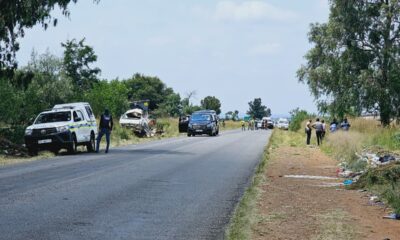Best of Johannesburg
What To Do If You’re Facing Emotional Abuse in South Africa 2025

The quiet harm that counts
It doesn’t always start with bruises. Emotional abuse can feel like walking on eggshells every day, being told you are worthless, or slowly being cut off from the people who care about you. In South Africa, it has taken years for the law to treat these invisible wounds with the same seriousness as physical violence. Today in 2025, emotional abuse is firmly recognised under the Domestic Violence Act, with expanded definitions and stronger systems to protect survivors.
The law now protects emotional harm
Since the Domestic Violence Amendment Act of 2021, emotional abuse is officially classified as a form of domestic violence. That means degrading comments, gaslighting, controlling behaviour, threats, humiliation, stalking, and even economic control can all form the basis for legal action.
The law gives survivors the right to apply for a protection order that forces the abuser to stop and can include practical safeguards like police escorts to collect belongings. Thanks to recent reforms, protection orders are applied for at magistrates’ courts, and some clerks are now able to assist with electronic submissions, which helps speed up the process. Interim orders are available around the clock to provide urgent relief.
In 2024, South Africa launched the National Council on Gender-Based Violence and Femicide, giving more muscle and funding to tackle all forms of abuse. It’s a sign that emotional trauma is no longer brushed aside as “less serious” than physical harm.
Recognising emotional abuse in daily life
It isn’t always obvious. Emotional abuse often looks like:
-
Constant insults, belittling, or being told you are “too sensitive”
-
Gaslighting and denial of things that clearly happened
-
Being isolated from friends or family under the guise of “care”
-
Threats, intimidation, or emotional blackmail
-
Controlling your finances, movements, or communication
-
Humiliation in public or private spaces
These patterns eat away at self-worth and mental health. Studies show they can be as damaging as physical violence, often leading to depression, anxiety, PTSD, or suicidal thoughts if left unchecked.
Where to turn right now
If you are in immediate danger, call SAPS on 10111. Police are legally required to respond and record your case and can seize weapons if there is a risk.
For confidential support, you can reach out to:
-
Gender-Based Violence Command Centre: 0800 428 428
-
STOP Gender Violence Helpline: 0800 150 150
-
Childline South Africa (for children and young people): 0800 055 555 or 116
-
National Shelter Movement: 0800 001 005
-
TEARS Foundation Hope Line: 08000 83277
These helplines are free, available 24/7, and connect you with shelters, counselling, and legal support.
For children and teens, speaking to a teacher, school counsellor, or trusted relative is also a critical first step. Abuse thrives in silence, and breaking that silence opens the door to safety.
Safe centres and ongoing care
South Africa has rolled out Thuthuzela Care Centres and Khuseleka One-Stop Centres, designed to provide everything survivors need in one place: medical help, trauma counselling, legal assistance, and safe shelter referrals.
Beyond emergency care, therapy remains a vital part of recovery. Trauma-informed counsellors and psychologists can help rebuild confidence, process pain, and break cycles of abuse that too often stretch across generations.
Why it matters for South Africa
Our country faces one of the highest gender-based violence rates in the world. Emotional abuse, though quieter than physical violence, contributes to that crisis. Left unchallenged, it passes through families, leaving children scarred and communities weakened.
Public awareness has grown. Social media often becomes a rallying space for survivors sharing their stories, building solidarity, and pushing for accountability. Each testimony chips away at the silence that once shielded abusers.
If you are being emotionally abused, know this: the law is on your side, help is at hand, and you are not to blame. South Africa in 2025 offers clearer pathways than ever before, through legal protection, helplines, and safe spaces, to reclaim your freedom and peace of mind.
You deserve more than survival. You deserve dignity, respect, and the chance to heal.
Also read: Inside a South African Bail Hearing: What Really Happens in 2025
Follow Joburg ETC on Facebook, Twitter, TikT
For more News in Johannesburg, visit joburgetc.com
Featured Image: Domestic Shelters



























